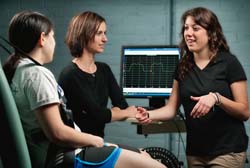 |
 |
| current issue |  | past issues |  | send a letter/news |  | address update |  | advertise |  | about us |  | alumni home |
Features
|
A New Way to Exercise
|
Return to Don't Cast Off Without a Paddle |
How could a blood pressure cuff help astronauts stay strong in space? NASA was intrigued enough to fund a study to explore the idea.
UNH exercise science assistant professor Summer Cook received funding from NASA to research how blood flow restriction exercises could help astronauts when they spend extended time in a weightless environment where maintaining muscle strength is difficult.
"We were trying to come up with an exercise protocol to prevent muscle weakness and atrophy for astronauts," Cook said. "It's a major problem for astronauts and the longer they are in space, the worse it becomes."
The study, done during Cook's dissertation at Syracuse University, involved a unique strength training technique: strapping an inflated blood pressure cuff around the exercising limb. While restricting the blood flow, the cuff intensifies the exercise.
 Dina Milano ’13, right, exercise science major, with grad student Alyssa Mazzela and Summer Cook, assistant professor, exercise science |
To mimic the weightlessness astronauts experience in space, Cook placed students on crutches for a month. The subjects who performed leg lifts with the blood pressure cuff around their thighs, were able to maintain their strength.
This summer, Cook will launch another study involving blood flow restriction exercises.
With the help of one of her students, Cook will focus on a population that has largely been ignored in the innovative exercise training: women.
Cook and Dina Milano '13, an Exercise Science major, will research how quickly women recover muscle strength using the blood flow restriction regime. The results could be particularly helpful for aging women needing to rebuild muscle after injuries or bone replacement surgeries. While restricting the blood flow, the cuff intensifies the exercise and allows for a lighter weight load. With the reduced weight, the risk of damaging joints or ligaments is minimized.
"There haven't been many studies on females, especially older women," Milano said. "I'm excited to be one of the first people working on this, especially as an undergraduate."
With funding from a UNH Student Undergraduate Research Grant, Milano will study a group of twelve older women between the ages of 60 and 80, while Cook will evaluate a younger group of women ages 18 to 30.
Before the women begin leg extension exercises, Cook and Milano will strap a blood pressure cuff around the subjects' thighs. While their blood flow is restricted, they will perform the exercise at 30 percent of their maximum strength. A dynamometer will measure their muscle fatigue and soreness immediately after the first regime and then when they repeat the exercise 24, 48, and 96 hours later.
"The study will help us prescribe how often blood cuff exercises should occur," Milano said.
The findings, Cook explained, could be especially beneficial in rehabilitation centers or hospitals where patients recover from injuries or bone replacement surgeries. "These exercises could be helpful to elderly people who may be frail and want to improve muscle strength but don't want to overload their joints with heavy weights," Cook said.
Besides its potential benefit to aging patients, the study allows Milano to experience first-hand what she has read in textbooks or learned in lectures.
"Working in the lab is a completely different than sitting in the classroom," said Milano, a native of Bell Point, N.Y. "You learn so much more and it's exciting to research something that could actually be used to help people."
The lab research also gives Cook the chance to spend one on one time with her student. "It gives us the opportunity to talk to about her future, where she may want to attend grad school or what researchers may be good for her to work with," Cook said.
For Milano, the project reaffirms her commitment and passion to Exercise Science.
"It definitely makes me excited," Milano said, "about doing more research in the future."
—Barbara Walsh '81
blog comments powered by Disqus

